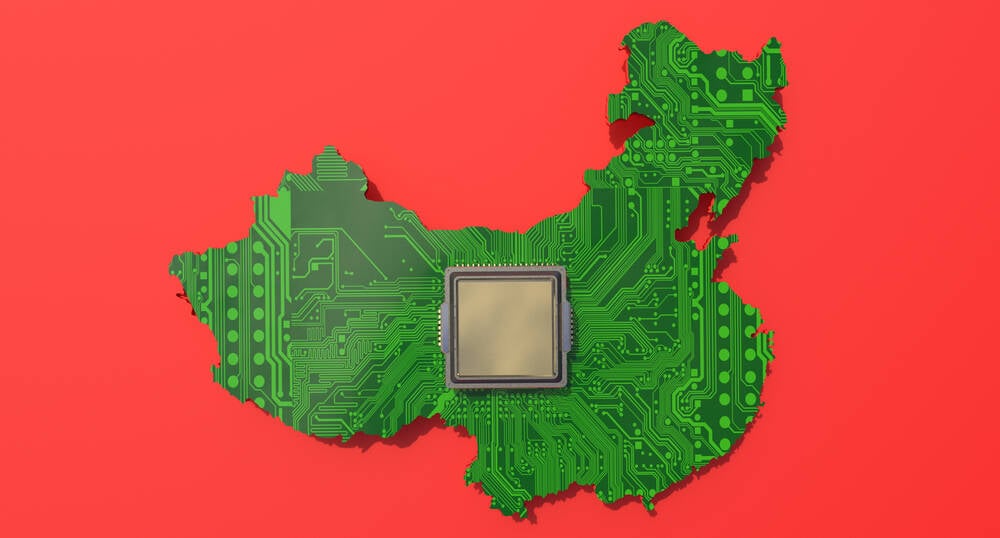Alibaba, Tencent Enlisted To Help Sanction-weary China Build RISC-V Chips

China is reportedly leaning on domestic tech giants Alibaba and Tencent to design RISC-V chips as part of the country's efforts to insulate itself from the effects of the United States' growing silicon sanctions.
This is according to a Wednesday report by The Financial Times, which said China has "enlisted" the two companies. That word has quite the insinuation, given the country's "military-civil fusion" doctrine, where private firms must share their technologies, and any software vulnerabilities, with China's military.
The report said Alibaba and Tencent are part of a new consortium of companies and research institutes set up by the Chinese government that aims to create new intellectual property for chips based on the open-source RISC-V instruction set architecture (ISA). This means China is looking to cook up core designs and other silicon building blocks that will serve as the basis for future chips.
China views RISC-V as a safer alternative to the proprietary Arm ISA over fears that the latter will be subject to future US sanctions. After all, Arm, is British but has a big American presence, and its owner, SoftBank, hopes to list Arm on a US stock exchange next year.
The FT also said the consortium, called the Beijing Open Source Chip Research Institute, has already developed a high-performance RISC-V chip named Xiangshan. The newspaper said the chip is meant to rival Arm technology, but it didn't specify which core design in Arm's portfolio.
- China may prove Arm wrong about RISC-V's role in the datacenter
- Chinese city of Shenzhen offers free money to boost chip industry
- Alibaba Cloud plans for a fifth of its servers to use homebrew Arm CPUs by 2025
- Ubuntu continues expanding RISC-V support – now, the $17 Sipeed LicheeRV
Alibaba and Tencent have already launched their own Arm-based chips, but there is apparently trepidation at both companies about Arm's future in China.
The newspaper reported that Alibaba and China's ByteDance, the owner of TikTok, already had plans underway to develop RISC-V chips for AI and datacenter applications. This goes beyond what we previously knew about Alibaba's RISC-V plans, which were mostly limited to edge and IoT appliances.
One senior engineer at T-head, Alibaba's chip division, told the newspaper that the company's goal is to replace its Arm chips "in our most advanced products." The FT also quoted a Tencent engineer, who called Arm "too risky now."
While one Chinese official described the consortium's RISC-V efforts as being on the "right track," the official added that the ISA's fragmentation issues have slowed down efforts to replace Arm designs.
China's creation of the Beijing Open Source Chip Research Institute is the country's latest step in embracing RISC-V as a way to escape sanctions led by the US. China has been heavily involved in RISC-V's development over the past few years through RISC-V International, the ISA's governing body that relocated its headquarters from the US to Switzerland in 2020 over geopolitical concerns. ®
From Chip War To Cloud War: The Next Frontier In Global Tech Competition
The global chip war, characterized by intense competition among nations and corporations for supremacy in semiconductor ... Read more
The High Stakes Of Tech Regulation: Security Risks And Market Dynamics
The influence of tech giants in the global economy continues to grow, raising crucial questions about how to balance sec... Read more
The Tyranny Of Instagram Interiors: Why It's Time To Break Free From Algorithm-Driven Aesthetics
Instagram has become a dominant force in shaping interior design trends, offering a seemingly endless stream of inspirat... Read more
The Data Crunch In AI: Strategies For Sustainability
Exploring solutions to the imminent exhaustion of internet data for AI training.As the artificial intelligence (AI) indu... Read more
Google Abandons Four-Year Effort To Remove Cookies From Chrome Browser
After four years of dedicated effort, Google has decided to abandon its plan to remove third-party cookies from its Chro... Read more
LinkedIn Embraces AI And Gamification To Drive User Engagement And Revenue
In an effort to tackle slowing revenue growth and enhance user engagement, LinkedIn is turning to artificial intelligenc... Read more

